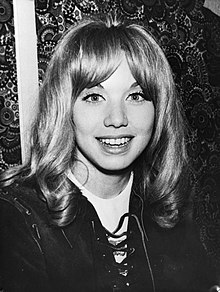María Isabel Llaudes Santiago (born 4 December 1945), better known by her stage name Karina, is a Spanish singer and actress who had her biggest success from the late 1960s until the mid-1970s in Spain and Latin America. She represented Spain at the 1971 Eurovision Song Contest with the song "En un mundo nuevo", where she placed second.
Karina | |
|---|---|
 Karina, 1971 Eurovision song contest. | |
| Background information | |
| Birth name | María Isabel Llaudes Santiago |
| Born | 4 December 1945 Jaén, Spain |
| Genres | Yé-yé |
| Years active | 1961–present |
| Labels | |
| Spouse(s) |
|
Career
After having entered several radio contests, she was chosen to sing on a flexi disc that a brand of car lubricant gave away with the purchase of its products, which was the first song she recorded, "Bikini Amarillo". She subsequently recorded several albums with RCA, and participated in the 1961 Benidorm International Song Festival with the song "No preguntes por qué". She became known to the Spanish audience in 1963 when she starred in the television musical show Escala en hi-fi on Televisión Española (TVE), and in the film adaptation of it.
In 1965, she signed with Hispavox where she recorded "Muñeca de cera" and the contemporary versions in Spanish and Portuguese of the James Bond song "Goldfinger". Also in 1965, she participated in the Mallorca International Song Festival with the song "Me lo dijo Pérez", placing second. In 1966, she was awarded as the Best Yé-yé Singer. Several of her songs, like "Romeo y Julieta", "Las flechas del amor", "El baúl de los recuerdos", and "La fiesta" became hits in Spain. She also starred in several films such as Los chicos del Preu and Would You Marry Me? (both in 1967), and in La chica de los anuncios (1968).
In 1970, she participated in Pasaporte a Dublín, TVE's national selection for the 1971 Eurovision Song Contest. She won the selection, so she represented Spain in Eurovision with the song "En un mundo nuevo" where she placed second, bested only by Monaco's contestant Séverine with her song "Un banc, un arbre, une rue". She recorded "En un mundo nuevo" also in French, German, English, and Italian. After Eurovision she starred in the same-titled film En un mundo nuevo, which was inspired by her participation at the contest and which shows real footage of it. At the end of the yé-yé years she moved to Mexico where she became moderately successful singing rancheras. She is still performing today.
In 2023, Karina was a celebrity guest in the episode Snatch Game - España Season 3 of the reality television show Drag Race España on ATRESplayer Premium. Also in 2023, she participated in the eighth season of the reality show Gran Hermano VIP on Telecinco, quitting after twenty-five days.
Personal life
Karina was born in Jaén, Andalusia to Trinidad Santiago and Salvador Llaudes. She has been married four times and has two daughters. In recent years, she was diagnosed with thyroid cancer but has since made a full recovery.
Discography
Selected LP
- 1966: "Karina Vol. I"
- 1968: "Karina Vol. II"
- 1970: "Karina Vol. III"
- 1970: "Colores"
- 1971: "Pasaporte a Dublín"
- 1972: "Tiempo al tiempo"
- 1972: "Lo mejor de Karina"
- 1973: "Lo mejor de Karina"
- 1974: "Lady Elizabeth"
- 1974: "Juntos para ayudarte"
- 1978: "Karina"
- 1985: "El disco de oro de Karina"
- 1991: "Soy como soy"
- 1995: "Primera época (1961–1964)"
Filmography
Film
- Escala en hi-fi (1963)
- El último sábado (1966)
- Los chicos del Preu (1967)
- Would You Marry Me? (1967)
- La chica de los anuncios (1968)
- ¡Viva la vida! (1969)
- En un mundo nuevo (1972)
- Camera Café, la película (2022)
Television
- Escala en hi-fi (1963–64, 7 episodes)
- Pasaporte a Dublín (1970, 12 episodes)
- Hostal Royal Manzanares (1997, 1 episode)
- Gran Hermano VIP (2023, 25 days)
Notes
See also
References
- "Maribel Llaudés". los40.com (in Spanish). Retrieved 29 July 2010. [dead link]
- "Karina, la chica más yeyé" (PDF). eurovision-spain.com (in Spanish). Archived from the original (PDF) on 10 July 2011. Retrieved 29 July 2010.